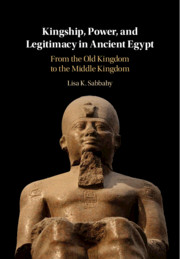Book contents
- Kingship, Power, and Legitimacy in Ancient Egypt
- Kingship, Power, and Legitimacy in Ancient Egypt
- Copyright page
- Contents
- Figures
- Preface
- Acknowledgments
- Introduction
- Chapter One Background to Ancient Egypt
- Chapter Two The Early Old Kingdom
- Chapter Three The Later Old Kingdom
- Chapter Four The Early Middle Kingdom Reunifies Egypt
- Chapter Five The Beginning of the Twelfth Dynasty
- Conclusion
- Bibliography
- Index
Chapter Three - The Later Old Kingdom
Published online by Cambridge University Press: 26 November 2020
- Kingship, Power, and Legitimacy in Ancient Egypt
- Kingship, Power, and Legitimacy in Ancient Egypt
- Copyright page
- Contents
- Figures
- Preface
- Acknowledgments
- Introduction
- Chapter One Background to Ancient Egypt
- Chapter Two The Early Old Kingdom
- Chapter Three The Later Old Kingdom
- Chapter Four The Early Middle Kingdom Reunifies Egypt
- Chapter Five The Beginning of the Twelfth Dynasty
- Conclusion
- Bibliography
- Index
Summary
Traditionally, the beginning of the Fifth Dynasty has been tied to a story in the Westcar Papyrus, in which the wife of a priest of the sun god gives birth to triplets. Goddesses appeared to help with the birth, and, as each male child was born, Meskhenet, the divine midwife, said: “A king who will assume the kingship in this whole land” (Lichtheim 1973, 220). Many books about the history of ancient Egypt interpret this story quite literally, stating that the first three kings of the Fifth Dynasty, Userkaf, Sahura, and Neferirkara, were brothers who were born as triplets. This situation is no longer accepted as history, although it is possible that the story may reflect the situation of Queen Khentkaues I, who appears to have been the mother of two kings.
- Type
- Chapter
- Information
- Kingship, Power, and Legitimacy in Ancient EgyptFrom the Old Kingdom to the Middle Kingdom, pp. 76 - 120Publisher: Cambridge University PressPrint publication year: 2020

